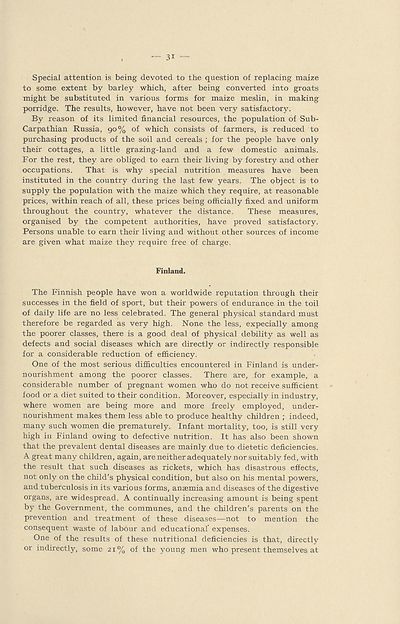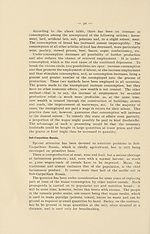Download files
Complete book:
Individual page:
Thumbnail gallery: Grid view | List view

— 3i —
Special attention is being devoted to the question of replacing maize
to some extent by barley which, after being converted into groats
might be substituted in various forms for maize meslin, in making
porridge. The results, however, have not been very satisfactory.
By reason of its limited financial resources, the population of Sub-
Carpathian Russia, 90% of which consists of farmers, is reduced to
purchasing products of the soil and cereals ; for the people have only
their cottages, a little grazing-land and a few domestic animals.
For the rest, they are obliged to earn their living by forestry and other
occupations. That is why special nutrition measures have been
instituted in the country during the last few years. The object is to
supply the population with the maize which they require, at reasonable
prices, within reach of all, these prices being officially fixed and uniform
throughout the country, whatever the distance. These measures,
organised by the competent authorities, have proved satisfactory.
Persons unable to earn their living and without other sources of income
are given what maize they require free of charge.
Finland.
The Finnish people have won a worldwide reputation through their
successes in the field of sport, but their powers of endurance in the toil
of daily life are no less celebrated. The general physical standard must
therefore be regarded as very high. None the less, expecially among
the poorer classes, there is a good deal of physical debility as well as
defects and social diseases which are directly or indirectly responsible
for a considerable reduction of efficiency.
One of the most serious difficulties encountered in Finland is under¬
nourishment among the poorer classes. There are, for example, a
considerable number of pregnant women who do not receive sufficient
food or a diet suited to their condition. Moreover, especially in industry,
where women are being more and more freely employed, under¬
nourishment makes them less able to produce healthy children ; indeed,
many such women die prematurely. Infant mortality, too, is still very
high in Finland owing to defective nutrition. It has also been shown
that the prevalent dental diseases are mainly due to dietetic deficiencies.
A great many children, again, are neither adequately nor suitably fed, with
the result that such diseases as rickets, which has disastrous effects,
not only on the child’s physical condition, but also on his mental powers,
and tuberculosis in its various forms, anaemia and diseases of the digestive
organs, are widespread. A continually increasing amount is being spent
by the Government, the communes, and the children’s parents on the
prevention and treatment of these diseases—not to mention the
consequent waste of labour and educational’ expenses.
One of the results of these nutritional deficiencies is that, directly
or indirectly, some 21% of the young men who present themselves at
Special attention is being devoted to the question of replacing maize
to some extent by barley which, after being converted into groats
might be substituted in various forms for maize meslin, in making
porridge. The results, however, have not been very satisfactory.
By reason of its limited financial resources, the population of Sub-
Carpathian Russia, 90% of which consists of farmers, is reduced to
purchasing products of the soil and cereals ; for the people have only
their cottages, a little grazing-land and a few domestic animals.
For the rest, they are obliged to earn their living by forestry and other
occupations. That is why special nutrition measures have been
instituted in the country during the last few years. The object is to
supply the population with the maize which they require, at reasonable
prices, within reach of all, these prices being officially fixed and uniform
throughout the country, whatever the distance. These measures,
organised by the competent authorities, have proved satisfactory.
Persons unable to earn their living and without other sources of income
are given what maize they require free of charge.
Finland.
The Finnish people have won a worldwide reputation through their
successes in the field of sport, but their powers of endurance in the toil
of daily life are no less celebrated. The general physical standard must
therefore be regarded as very high. None the less, expecially among
the poorer classes, there is a good deal of physical debility as well as
defects and social diseases which are directly or indirectly responsible
for a considerable reduction of efficiency.
One of the most serious difficulties encountered in Finland is under¬
nourishment among the poorer classes. There are, for example, a
considerable number of pregnant women who do not receive sufficient
food or a diet suited to their condition. Moreover, especially in industry,
where women are being more and more freely employed, under¬
nourishment makes them less able to produce healthy children ; indeed,
many such women die prematurely. Infant mortality, too, is still very
high in Finland owing to defective nutrition. It has also been shown
that the prevalent dental diseases are mainly due to dietetic deficiencies.
A great many children, again, are neither adequately nor suitably fed, with
the result that such diseases as rickets, which has disastrous effects,
not only on the child’s physical condition, but also on his mental powers,
and tuberculosis in its various forms, anaemia and diseases of the digestive
organs, are widespread. A continually increasing amount is being spent
by the Government, the communes, and the children’s parents on the
prevention and treatment of these diseases—not to mention the
consequent waste of labour and educational’ expenses.
One of the results of these nutritional deficiencies is that, directly
or indirectly, some 21% of the young men who present themselves at
Set display mode to:
![]() Universal Viewer |
Universal Viewer | ![]() Mirador |
Large image | Transcription
Mirador |
Large image | Transcription
Images and transcriptions on this page, including medium image downloads, may be used under the Creative Commons Attribution 4.0 International Licence unless otherwise stated. ![]()
| League of Nations > Economic and financial section > Problem of nutrition > (33) |
|---|
| Permanent URL | https://digital.nls.uk/190924191 |
|---|
| Shelfmark | LN.II |
|---|
| Description | Over 1,200 documents from the non-political organs of the League of Nations that dealt with health, disarmament, economic and financial matters for the duration of the League (1919-1945). Also online are statistical bulletins, essential facts, and an overview of the League by the first Secretary General, Sir Eric Drummond. These items are part of the Official Publications collection at the National Library of Scotland. |
|---|---|
| Additional NLS resources: |
|

